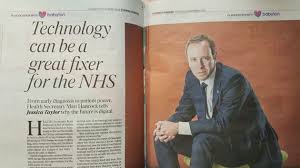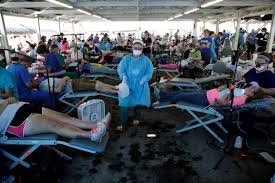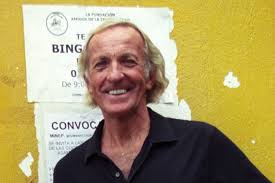At the end of this month we'll finally be leaving (or starting to leave) the EU and the people in charge of overseeing this, Boris Johnson, Michael Gove, Dominic Cummings etc;, will be the exact same ones who were in charge of the leave campaign so we can, of course, look forward to £18.2 billion a year going into the NHS as promised. Anything else would be nothing short of a crime.
It's not like the NHS couldn't do with it. John Pilger's feature length documentary, The Dirty War on the NHS, was aired on ITV eight days before Christmas last year and five days after Boris Johnson had won a landslide majority in our third general election in five years. It had some very uncomfortable things to say about not just the future of the NHS but where we are with it now. It's perhaps no wonder that some saw ulterior motives in the fact that it was held back until after the election before being aired.
The film begins, to the strains of the (co-opted) patriotic anthem Jerusalem, with a quote from former PM, and instigator of the divisive referendum, David Cameron:- "My love for the NHS, my respect for the NHS, runs through every sinew of my body. The NHS is safe in my hands". Like many things, from social order to a dead pig, it proved to be anything but safe in his hands.
Via interviews with doctors, nurses, patients, pastors, university professors, lobbyists, those from the NHS Support Foundation, Dr John Lister (founder of Keep Our NHS Public), Tamasin Cave from Spinwatch (a public interest group reporting on PR, lobbying, and power networks), and former Minister of State for Health and Social Security David Owen, Pilger tells us an epic, depressing, powerful, and most of all worrying, story of how the NHS is, piece by piece, being slowly transferred from a service to a business.
Patient dumping usually takes place between 10pm at night and 4am in the morning, when it's dark and there are less people to witness it. That's probably because those who practise it and, more importantly, those who order it know, deep down, it's morally indefensible. In the US, where there is no NHS or equivalent to it and many see it as a horrific socialist idea, 87,000,000 people cannot afford healthcare and, on an average year, 20,000 of them die because of this.
Patients who can't afford to pay for their beds are removed from hospitals in the dead of night and dumped at places like Franciscan House in Chicago. There's money in Chicago, as images of the ninety-eight storey Trump International Hotel and Tower prove, but not a lot of it finds its way to Franciscan House on the city's Skid Row.
This is the system that has 'inspired' NHS 'reforms' and now, sure enough, patient dumping is happening in the UK too. The NHS is a juicy £120 billion opportunity to those who see no value in anything other than wealth. The idea is not to abolish it, there would be a genuine outcry - even from those who support the government, but to turn it into a third class, failing, service that only ever needs to be accessed by the poor. Who, of course, don't matter.
The wealthy will have their private care. The poor? Well, if they will get ill perhaps it's better if they just died. Pilger notes how words like 'reform' and 'partnership' are simply euphemisms masking the privatisation of the NHS that is already happening and this isn't mere rhetoric. He has examples to prove it to us.
The failing defibrillators of privatised ambulance services (failing because they were purchased both second hand and untested), texts (texts!) being used in the middle of emergencies, a complete lack of planning, poor decisions, and, ultimately, prematurely dead patients.
Needless early death caused by the desire of others to increase their wealth. One patient interviewed speaks of waiting for a year, in constant pain, for a gall bladder operation. The NHS outsourced his treatment to a private hospital (Spire Parkway in Solihull) which had less facilities, less expertise, but a bigger budget and much slicker, and more corporate looking, advertising.
In the days before the National Health Service, women dying during childbirth was not uncommon, there were slums in our big cities with no running water and no sanitation, and, as Pilger (ever the polemicist) puts it, "Britain's deadly disease was class".
In 1942, during the middle of World War II, the economist, social reformer, and Liberal politician William Beveridge had warned that the war would be a revolutionary moment and he didn't just mean the eventual defeat of the Nazis. He foresaw, correctly, that this would bring about great changes in peacetime too.
The elite were worried. If soldiers could die for their country it seemed only fair that they might expect their country to help them when they, or their families, find themselves in need. When Winston Churchill, the war hero, opposed the creation of the welfare state he was jeered and booed while campaigning in the industrial heartlands, yet continued delivering speeches that criticised "Utopian wool gatherers".
The Daily Mirror, which in the thirties had been sympathetic to Oswald Mosley and the British Union of Fascists, switched its editorial stance post-war and began to support Clement Attlee's Labour Party. On 5th July 1945 they won a landslide election and saw Winston Churchill's first spell of PM come to what in retrospect looks like an astonishing end.
Exactly three years later, on the 5th July 1948, and with Aneurin 'Nye' Bevan installed as Minister for Health, each household in Britain received a leaflet through the letterbox. A leaflet which explained what the NHS is and how people would be able to access it. For the first time ever British people had been given freedom from the fear of being unable to afford their healthcare bills. It was a system so successful, and so popular, that the following decades saw versions of it appear in Sweden, Iceland, Norway, Denmark, Finland, Japan, Canada, Australia, South Korea, Taiwan, Israel, and Thailand.
If you're proud of Britain, don't be proud of flags, wars, or the royal family. Be proud of the NHS. It is the greatest British achievement of all time and, at a time when talks of traitorous behaviour are more commonplace than they've ever been in my lifetime, a truly treacherous act would to be to allow it to go. The idea of a health service that is provided on the basis of need and not wealth and one that is free at the point of delivery has long been the world's envy and, by 1968, thanks to the NHS, the UK had the lowest infant mortality rate in the world.
1968 was the year I was born so I'm very thankful about that. Turns out I could hardly have 'chosen' a better year to make my debut. By the 1970s, Margaret Thatcher and her closely aligned friend and advocate of free market reform Nicholas Ridley, both then in opposition, were beginning to look at ways of returning to the private sector and they were quite clear that it would need to be done by stealth.
Thatcher got distracted by wars in the Falklands and the miners strike but by the late eighties, along with Oliver Letwin and John Redwood, she got back to those plans. Redwood and Letwin produced a leaflet called 'Britain's Biggest Enterprise:Ideas for Radical Reform of the NHS' in which ideas for at least part-privatisation of the service were called for while, all the time, making it very clear that covert and surreptitious behaviour would be needed to make this an actuality.
Pretty straight guys, eh? They're not the only ones bleeding the NHS dry to fill their own wallets. Philip Morris and other tobacco firms use The Institute of Economic Affairs to lobby government and there are many other, similar, thinktanks, right wing lobby groups, and climate change denialists with their headquarters in Westminster constantly pressuring the government to act in their own interests and against the interests of their citizens and voters.
The money siphoned off to consultants, outsourcing companies, and investors is what's causing the NHS its crisis. It's not the foreign welfare scroungers the right wing tabloids like to say it is. One person of particular interest when it comes to fleecing the NHS is Ali Parsa, a former executive director of banking at Goldman Sachs, whom we're shown giving a TED talk about how he plans to revolutionise healthcare on a global scale.
She had a meeting with Parsa in which Vince Cable, then Secretary of State for Business, Innovations and Skills, was also in attendance. Cable is reported to have constantly referred to the hospital as a business. When picked up on this by medical staff he was adamant that a business is very much what that hospital, any hospital, is.
Patient dumping in all but name. The nurses were expected to report back to Circle daily on their findings. This changed the working environment drastically, and not for the better. People who had previously worked as a team were being forced to compete against each other and nurses who failed to free enough beds were repeatedly told they were failures and bad at their job.
Undermining confidence of your own staff seems like a fool's errand but it is a recognisable, and known, corporate strategy in the workplace these days. I suffered under it, in a much less vital job, for many years. It's as if the sharp business practices that caused a global economic recession have simply been moved to other spheres of employment. No punishment was given to the bankers who created these problems and, perhaps, that's why no lessons have been learned.
Damning reports were produced and, for the first time ever, Hinchingbrooke was put in 'special measures'. Patients, including children, were deemed to be at risk due to the poor running of the hospital and, in 2015, Circle abandoned Hinchingrbooke and it was returned to NHS control. The NHS had to sort out the financial damage done by Circle and restore the trust of both local people, potential hospital users, and staff. A nurse openly cries when remembering how painful the time was.
Not for Ali Parsa though. Parsa had stepped down from Circle in 2012 and was given a £500,000 golden goodbye to see him on his way. The rich and powerful, as well we all know, tend to fail upwards. Parsa, of course, refused to be interviewed for the film but the nurse who had worked there spoke of twenty-four years of working life, of what had felt like a second family, being ripped apart on the rapacious whims of selfish privateers, money men, and callous operators.
Parsa's next project was Babylon Health and an app called GP at Hand in which using your phone, tablet, or laptop you can have direct access to a general practitioner. As long as you don't mind that, on some occasions, that GP will be a robot and not a person.
Older people struggle with technology but even for those who don't this brings up a whole raft of issues and problems. Machines can't read body language, they can't understand metaphors, and they can't recognise the signs that a patient may be understating, or overstating, the severity of their condition. These are all things doctors learn over a long career and robots, so far, cannot replicate.
One person who's intensely relaxed about this is current Secretary of State for Health and Social Care Matt Hancock. Hancock's not just a big believer in the efficacy of Babylon Health, he's even appeared in a double page advert in the Evening Standard for them in which he recommends their products. He's shilling for them. He's in their pocket.
The money keeps many there but another who could no longer square it with her conscience is Dr Linda Peeno. Peeno had worked for the Louisville based health insurance company Humana before, in 1996, admitting in court that, nine years earlier, while acting for Humana, she had denied a man a necessary life saving operation, a heart transplant, and had thus caused his premature death.
There had even been a match ready, a donor heart, but the cost meant that, instead, the patient was consigned to what Peeno calls "cardiac hell" and, ultimately, his own death. Every sane person should despair of the American health system and many Americans do so too. A few heroes are doing something about it. We visit Wise, Virginia. On the egde of the Appalachian Mountains.
Wise is a poor town where most of the work provided by the coal industry has now gone. Each summer RAM (Remote Area Medical) comes to town and the poor and unwell of Wise, and for miles around, sleep overnight in their cars or tents to receive free treatment regardless of either income or demographic concerns.
But if you're poor, and in need of healthcare in America, you are, to all intents and purposes, living in the developing (or, more truthfully, relapsing) world. These people are sleeping overnight at a makeshift field hospital because they have no other option but that's not the way it has to be. That's the way America has decided it must be. That's what America voted for. Could the same happen in the UK?
You'd like to think not but evidence suggests otherwise. The UK is the fifth richest country in the world but nearly a third of its children live in poverty so we're already pretty relaxed about inequality. The financial crash of 2008 was caused by bankers in the City (as well as in Wall Street) but they weren't the ones who suffered because of it.
The banks were bailed out by the government and, with the policy of austerity, those who were least responsible for the crash, and those already under the most hardship, were the ones punished for it. The debt the banks owe to the public purse is so huge that if they were to pay it back there would be no need whatsoever for austerity.
Why are the poorest picking up the bill for the recklessness of the rich? Why are they paying their fair share when mega rich tax avoiders are not? Why is life expectancy in the UK going down? Why are mortality rates at the highest for fifty years? The answers can all be found in the Tory goverment's policy of austerity and the cuts to health and social services enacted under that policy.
It is estimated that 120,000 people, so far, have died premature deaths because of this policy. For some reason his contribution to this figure has earned Iain Duncan Smith (a strong contender for Britain's most odious man) a knighthood which only adds to the bleak picture of healthcare in Britain in 2020. Privatisation has demotivated healthcare staff and some, understandably in the circumstances, aren't putting in the extra like they used to, a homeless refuge in Clapham is seeing more and more cases that look very similar to the US model of patient dumping, and some NHS workers are now homeless.
These small personal actions undoubtedly help but bigger change is needed. David talks about how political decisions directly affect homelessness (and anybody living in London cannot fail to have observed the huge increase in people living on the streets during the last decade of Tory (mis)rule). A 2010 Westminster bylaw made it illegal to feed homeless people.
The freedom of fear we gained with the creation of the NHS is no longer a freedom we can take for granted. For many people, it is a freedom that has long ago deserted them. It was a political decision to give us the NHS in the first place. The decision to take it away from us (not something that might happen, something that already is happening) is a political one also.
That £350 million that's been promised to the NHS every week once we leave the EU? We all better hope that wasn't a lie. The question you need to ask yourself is do you trust Boris Johnson to come good on his promises? A brighter man than me once said "check the guy's track record".




























No comments:
Post a Comment